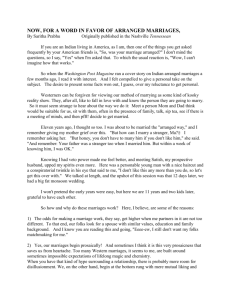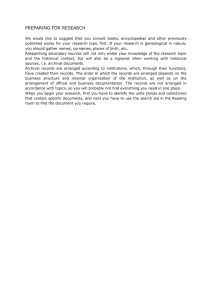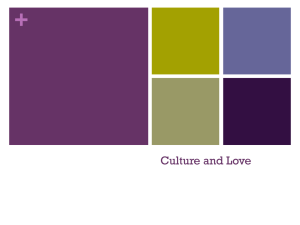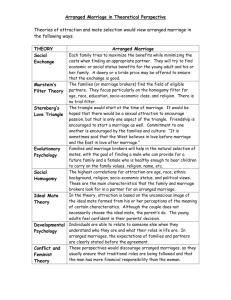The Idea of Arranged Marriages in India Then and Now
advertisement
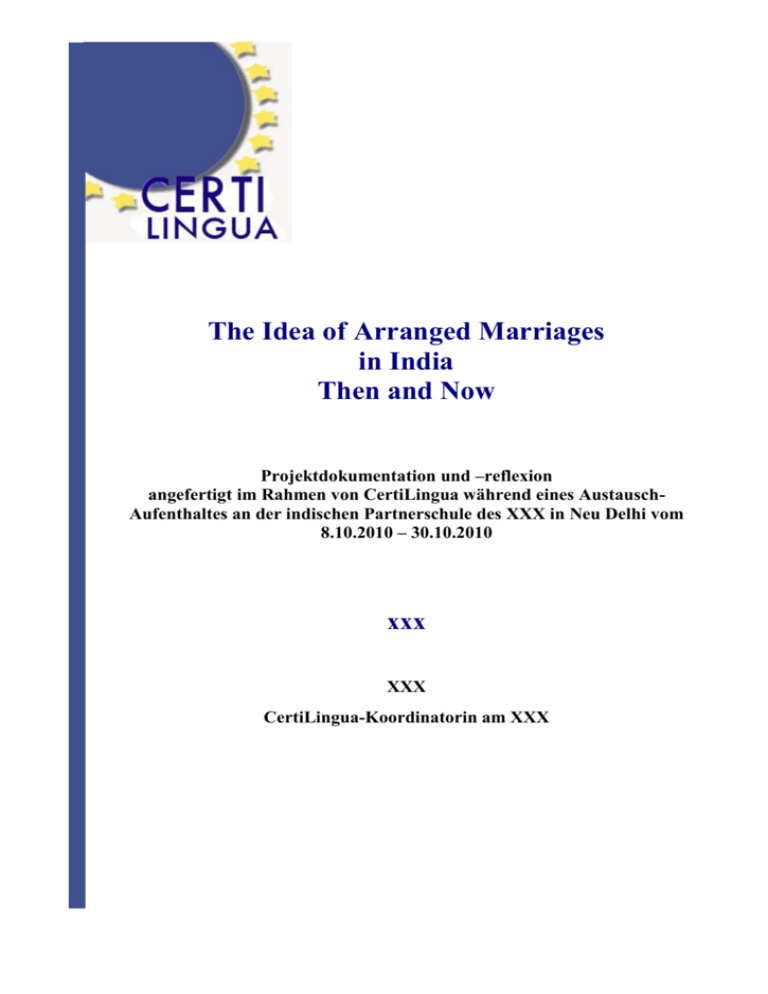
The Idea of Arranged Marriages in India Then and Now Projektdokumentation und –reflexion angefertigt im Rahmen von CertiLingua während eines AustauschAufenthaltes an der indischen Partnerschule des XXX in Neu Delhi vom 8.10.2010 – 30.10.2010 xxx XXX CertiLingua-Koordinatorin am XXX Table of Contents 1. Introduction ............................................................................................3 1.1 Description of my project..................................................................3 1.2 Personal view on my project.............................................................4 1.3 Educational context of my project....................................................5 2. My project...............................................................................................5 2.1 Carrying out my project....................................................................5 2.1.1 What is an arranged marriage?..............................................6 2.1.2 Conducting the interviews....................................................6 2.2 Personal experiences in the course of my project...........................10 3. Reflection and Retrospection................................................................11 4. Outlook..................................................................................................13 5. References.............................................................................................15 5.1 Monographs.....................................................................................15 5.2 Internet sources................................................................................15 6. Appendix...............................................................................................16 6.1 Internet Sources...............................................................................16 6.2 Questionnaire...................................................................................17 3 1. Introduction Two years ago, my school, the Gymnasium XXX in XXX, introduced an exchange programme with New Delhi’s Public School Rohini in India. When I heard about this programme for the first time in 2009, I was not interested in any way. I had picked up information about this country only rarely and everything I could remember was the fact that India is a huge country, far away from Germany and marked by poverty. Of course, all these memories did not motivate me to participate in the exchange programme, although I generally like to get to know foreign cultures. One year later, when the same possibility came up again, everything was different, since I had got to know India better. First of all, I got to know the really positive reports of those who had decided to go to India in the autumn of 2009. Secondly, the topic ‘India’ came up at school: Not only during some of my English lessons but also in Social Sciences. Thirdly and lastly, all the facts mentioned above aroused my curiosity. Therefore I had to recognise the importance of India in the daily news. This was why I decided to participate in the exchange programme, meaning that I would take care of an Indian exchange partner for three weeks in May and, in return, would go to India for three weeks in October 2010. I did not only want to know India from school or from the news, but also wanted to come into contact with the country itself, the people and their culture. 1.1. Description of my project As already mentioned, India had been important at school, already before I went there: During my English lessons I got to know the country as a former English colony. We learned about Indian history, religion and culture, had discussions about Gandhi but also about Indian everyday life of which arranged marriages are an important aspect. Besides, I became acquainted with India’s economic image: A fast developing country which is becoming more and more modern, at least in terms of economy. Exactly these two ideas gave me the impression of a contradiction. I could not imagine that an economic superpower would maintain traditional customs, one of which I especially bore in mind, namely the tradition of arranged marriages. 4 Although I had learned that arranged marriages are an essential aspect of the traditional Indian culture and that Indian teenagers nearly never question their practice, I could not really understand why. Therefore I wanted to get into a conversation about this topic in India, hoping that afterwards I would comprehend this tradition better. Many questions were on my mind: For instance, I wanted to know what Indian people regard as advantageous concerning arranged marriages and if they do not think that they are some kind of a restriction. Moreover, I was interested in the question if there have been significant changes in the course of time, and if yes, to what extent. Another thing I wanted to ask – especially people of my age – was the question if they already have experienced or will experience an arranged marriage and how they handle their situation. Still in Germany I prepared my project. I compiled a questionnaire to carry out a survey. In this way I could get concrete written answers and besides, could have the possibility of experiencing the people’s reactions to the topic of arranged marriages in face-to-face encounters. 1.2. Personal view on my project ‘A woman who is modest and shy will always be hungry’1 an Indian proverb says, which really strikes me, especially when I think of arranged marriages in India, since it exemplifies very well the wide-spread belief, especially of the Western world, that womens’ obedience and subjugation are the key terms of arranged marriages which then lead to a feeling of being unsatisfied. Due to this rather discriminating approach, I have always been convinced that the tradition of arranged marriages would be a rather historical topic and nowadays, would only be practiced very rarely. But I when I was confronted with this topic at school, I understood it better. This is why I expected a confirmation of my school knowledge, namely that arranged marriages were still an inherent part of the Indian culture, as a result of my project. But what seemed to be much more important to me was to get an answer to the question ‘Why?’ To get an answer, I would probably be confronted with many different reactions which made me feel a bit nervous: Would the people be firmly 1 Michaels, Axel: Der Hinduismus. Geschichte und Gegenwart. München 1998, p.144 („Eine Frau die bescheiden und schüchtern ist, wird immer hungrig sein“, Translation on my own) 5 convinced that arranged marriages are ‘better’ than love marriages and would they have understandable reasons? Would they maybe feel ashamed and talk for a long time without coming to the main point? Or would they – quite the contrary – say that they do not follow the tradition of arranged marriages? And what would be their reasons? Considering all these questions, it seemed to be obvious that it would be difficult to find one single answer to the ‘Why?’ or even to the ‘Why not?’ Nevertheless, I expected clear and satisfying answers concerning the advantages and disadvantages of arranged marriages, also with regard to the development of this cultural practice in the course of time. In this respect, it also becomes clear that my project has some international relevance in the accordance with the requirements of CertiLingua, as there will be a focus on the cultural differences between the Western idea of a love marriage and the Indian idea of an arranged marriage. I think it is important to have a close look at things which seem to be new and strange at first, instead of rejecting them without trying to understand. For this reason I regard this project as helpful since I have learned how to develop an approach to foreign people and their cultures. 1.3. Educational context of my project However, one should not overlook the fact that this project was not only of personal importance, but also the topic is linked to our school curriculum. In the English senior classes for example – in the basic courses as well as in the major courses - India is one of the main topics. Thanks to my project I could enrich the English classes with a lot of additional information, especially when we talked about the Indian culture, which I had experienced firsthand. This was also the case in Social Sciences, when we talked about India as an aspiring industrial power. 2. My project 2.1. Carrying out my project The preparation for my project already started in Germany. I dealt with the general information I had already acquired at school once more, did some research on my own and asked myself what exactly interested me about the topic of an arranged marriage and what I consequently wanted to ask the Indian 6 people. In this way I developed a questionnaire writing down my most important questions. During my stay in India, I carried out a survey and got into conversation with a lot of different people. I decided to choose ten interview partners on my own, instead of handing out about 100 questionnaires in town, for example. In this way I could make sure that I had interview partners of different ages and sex and besides, had the possibility of coming into face-to-face encounters. 2.1.1. What is an arranged marriage? Arranged Marriages are an age-old tradition in India. Generally one can define them as marriages in which neither the brides nor the grooms actively look for their future spouses. Instead, in most cases it is the father who feels called upon to choose a partner for his child2. Important criteria for selection are cast, religion, star sign, age, skin colour and character attributes.3 2.1.2. Conducting the interviews During my stay in India I interviewed ten people: Four of them were aged between 0 and 25, half were female and half were male. Three persons were aged between 25 and 50 and also three persons between 50 and 75 years old. In each of these age groups two of them were female and one of them was male. On the basis of this variety it was possible to get an overview of the tradition of arranged marriage, including the role of women as well as that of men. Moreover, it helps to find differences as to the practice of this custom then and now. However, one has to consider that I mainly got in contact with the higher classes of society. 1) Are arranged marriages regarded as a usual part of your culture? All interviewees, men as well as women and young as well as old people, said that arranged marriages are generally regarded as a usual part of their culture. 2 cf. http://www.culturalindia.net (23.8.2011) Cultural India. Weddings. Arranged Marriage. http://www.culturalindia.net/weddings/arranged-marriage.html 3 cf. Michaels, Axel: Der Hinduismus. Geschichte und Gegenwart. München 1998, pp. 130131 7 2) Do you and people around you consider arranged marriages as a taboo issue? No one of the interviewees answered this question with a ‘yes’. This supports the first question and seems to prove that Indian people do not hide behind the tradition of arranged marriages, but instead handle it in an open-minded way. 3) In your opinion, what are advantages of an arranged marriage in contrast to a ‘love marriage’? In the interviewees’ view there are many advantages coming along with an arranged marriage. First of all, many of them feel less pressured to find a suitable partner: While the parents keep in mind the best for their children, the children themselves can concentrate on other important things in life, like planning their careers, for instance. Moreover, the interviewees’ attached importance to the very low divorce rate of arranged marriages, which they consider to be based on the carefully chosen match-making criteria. Beyond that, they acknowledge the fact that the spouse’s parents will accept the partners. This basically means that there is not only a connection between the couple itself, but automatically also between their families. 4) In your opinion, what are disadvantages of an arranged marriage in contrast to a ‘love marriage’ In spite of all the above mentioned advantages of arranged marriages the interviewees were aware of disadvantages as well. The most frequent aspect considered to be a disadvantage is the fact that you are not free to make the most important decision in life on your own, and that, additionally, you do not get a lot of time before saying ‘yes’ or ‘no’ about whether you want to marry the chosen partner or not. Sometimes, one does not actually love the person one is going to marry. Instead, the feeling of being dependent on the parents becomes intensified. The fact that the parents choose the future spouse involves further disadvantages: For one thing, parents might give more weight to the 8 spouse's family and its financial status than to the spouse itself. Besides, one would have to blame one’s parents if the marriage does not work out. Since this is out of the question – as you do not criticise your parents – a sense of duty to stay together with the partner might emerge. Finally, the orientation according to the match making criteria supports the caste system or even racism. 5) For your future (past) would you prefer (have preferred) an arranged marriage or a love marriage? Why? Opinions differed on this question. Especially the elderly persons questioned preferred an arranged marriage. The most common reason is the fact that, in accordance with this tradition, they are happily married up to now. Regarding the younger interviewees, there was no consensus among them. Some of them were convinced that an arranged marriage was the best for them, justified by the arguments mentioned above that support this tradition. Quite on the contrary, there were others who turned their back on this way of marriage, mostly since they wanted to be completely independent and free in choice of their spouse – one of the most important decisions in life. 6) Do you know that you yourself will experience an arranged marriage? / Have you experienced an arranged marriage? Eight of the then interviewed persons answered this questions with a ‘Yes’. It is striking that the two persons who will not experience an arranged belong to the group of the 0 to 25-year-old persons. This shows very well that there might be a change towards more love marriages in the future. 7) Do you regard an arranged marriage as a kind of restriction? Why (not)? Even this question could not be answered either with a ‘yes’ or with a ‘no’. Half the interviewees took the view that arranged marriages could not be seen as restricting. The other part was convinced of the contrary. However, also most of this part was willing to accept the restriction of 9 not having the possibility of looking for a spouse themselves, since arranged marriages involve many considerable advantages as well (cf. arguments in favour of arranged marriages). This result gives evidence of the fact that arranged marriages only work out if the partners are content to accept each other and, besides, look for a mutual way of understanding. 8) Do you know someone who is happy with an arranged marriage? All interviewees knew at least one person who lived in a happily arranged marriage. This result makes it difficult to criticise this concept of marriage as an outsider and instead confirms that it can work out very well. 9) Will (did) you stick to the tradition of arranged marriages when you have (had) your own children? Why (not)? This question definitely implies possible differences in generations. The elderly people, for the most part, answered with a ‘Yes’, all of them for the simple reason that they have already had good experiences with an arranged marriage themselves. Moreover, some of them said that they did not want to feel guilty if their children did not find a partner themselves. The young generation is divided again. Some of them agree with the elderly people, since they are convinced of the success of arranged marriages as well. However, there are also some who do not want to intervene in their children’s life by continuing this tradition. Instead, they support a free and independent education. 10) With regard to arranged marriages have there been significant changes in the course of time? If yes, to what extent? An analysis of the different answers has revealed that in the course of time, the concept of arranged marriage has changed to a remarkable extent. Earlier, the future couple was never asked for consent, nor were they informed about each other. To guarantee that the daughter would have a 10 good life after her marriage, there was the introduction of a dowry system. This means that the parents gave a gift to their daughter and, consequently, also to her husband’s family to ensure a good treatment. Nowadays, most parents who have found a suitable partner ask their children for consent, whereby the match-making criteria have changed as well: It is true that the caste, or at least an affiliated caste, is still very important, but, with regard to the growing economy, aspects like education and income have gained in importance. This also explains the misuse of the traditional dowry system, which comes along with an enormous number of ‘bride burnings', even if they have officially been prohibited since 1961 by the Dowry Prohibition Act4: Many families demand huge gifts and sometimes even push their sons to have their wives burned at the stove, so that it looks like a household accident. This makes the man free for a new wife and therefore also free for a new dowry. 2.2. Personal experiences in the course of my project Through the results of my project I have found evidence of the thesis that arranged marriages are still an inherent part of the Indian culture. However, I have to admit that I was surprised, when I recognised that this is the case, although the people I talked to exactly knew what it means to have a love marriage. I was furthermore surprised about the way they treated me. I felt an incredibly impressive warmth, empathy and willingness to help me when I asked for an interview and also during the interview sessions. At the beginning I felt nervous and only cautiously touched upon the topic of arranged marriages, since I expected to encounter some people’s sore point. But everyone was willing to answer my questions openly, both advocates and opponents of this custom. Contrary to my expectations, I sensed pleasure on their part, in view of the fact that I wanted to get to know their culture. 4 cf. Erlbeck, Ruth: Frauen in Indien. Münster 1978, p.93 11 This advance really helped me to recognise that the generation-dependent differences of opinion, of which I had heard, are indeed noticeable in reality. In this context I would like to add the conversation with an Indian girl who also took part in the exchange programme and was of my age, which has sunken deeply into my memory. The girl explained to me that she has a low opinion of arranged marriages since she advocates an independent and free development. However, she knew that, sooner or later, she would experience an arranged marriage and although her whole family’s marriages had been arranged and up to now had also worked out successfully, her biggest fear was to blame her parents if she did not get on well with her chosen spouse. Her facial expression was really disappointed until she consoled herself by admitting that she would seize the opportunity to break this circle when she had her own children - at least she wanted to offer them this option. This conversation really left a lasting impression on me, especially since the girl was exactly of my age. Of course, I pitied her, but at the same time I was amazed that she did not act against her family’s decision and that instead, her biggest fear was to disappoint her parents. This gave me the impression that the family plays an essential role in the Indian culture. This impression was deepened when one man explained to me during the interview that the low rate of divorces was associated with the fact that in the Indian culture most people feel the duty to protect their families. I was really surprised since he was talking about people who accepted to sacrifice their own well-being to the well-being of their respective families. However, in view of the fact that the family plays one of the most essential roles in Indian peoples’ lives, I could understand what he wanted to explain to me. At that point I had the feeling of having understood the Indian culture, especially the practice of arranged marriages, far better than before the project. 3. Reflection and Retrospection Thanks to the various face-to-face encounters in the context of my project, I have been able to better understand the Indian tradition of arranged marriages. However, I am convinced that not only me, but also my interview partners profited from these conversations, since they had the possibility of bringing 12 their culture nearer to a foreign person. To my mind, in times of globalisation, both these aspects are enormously important. Especially as regards India, an aspiring economic power, it might be an advantage to become acquainted with this country: In a first step through learning its language and in a second step – equally necessary – through getting to know its culture. In this respect I consider my project a step forward for myself because it helped me not only to be informed about the Indian tradition of arranged marriages but also to grasp the different aspects and implications of this custom. To sum up my project’s results one can say that it is important to keep in mind that in the course of time people, their values and characteristics are changing. This has influenced Indian culture with its traditions, too and leads to the fact that also the procedure of arranged marriages still has to undergo various modifications. That this is already the case becomes clear if one compares arranged marriages then and now: For instance, the chance to have an opinion listened to and considered is becoming more and more important in contrast to the former obedience and submission to the parent’s choice of their child’s future spouse. Furthermore, there is no gainsaying the fact that especially in the younger generations more and more people abandon the age-old Indian tradition of arranged marriages, at least in the higher classes of society, with which I mainly got in contact during my interviews. In this respect one has to bear in mind that the changes I have noticed can only be described as the first beginnings of a further developing alteration. For Western people, this process of change seems to be natural, especially with regard to globalisation, though in India, this point of view is not completely accepted yet. Especially the lower classes of society namely often reject any westernising influences on society and thus inhibit the Indian society’s development. However, further alterations will doubtless be necessary: Just think of the dowry system, a traditional institution which has turned into a deadly national danger through the impact of globalisation. 13 Definitely the project did not motivate me to wish for an arranged marriage myself, but the inside I got into Indian culture it is still of personal importance. Back in Germany, for instance, I gave a talk about my results so that not only me but also all the other students of my class could profit from my first-hand experiences. Furthermore, the project was a good opportunity to practise and improve my English language skills, as all my conversations in India were in English, of course. I respected the interviewees’ opinions and, in return, expressed my own feelings and views on the subject of arranged marriages. In this way, I was able to participate in discussions, which reflected the cultural diversities between the East and West. Besides, I became aware of the importance to deal with those differences instead of completely rejecting them, because within the framework of the whole culture, including its own norms and values, the above mentioned diversities automatically become understandable, in most cases. Using the example of arranged marriages, for instance, one has to keep in mind the importance of the family in the Indian culture. Looking back, when it comes to coping with both linguistic and cultural diversities, I think it helped to contribute to my personal development. I am convinced that this is one of the keys to improve one’s general cultural awareness and, besides, to support one’s global problems. 4. Outlook As mentioned before, I have already profited from my project at school. But, of course, there is more to it. First, I would like to mention that in a way, the project also influenced my personality. Especially when I experienced how some Indian people – even though this is the minority – feel severely restricted by the custom of arranged marriages, I began to appreciate the freedom of choice as to marriages in our culture. Beyond that, I have learned to appreciate my freedom of expression, if I think of the fact that there are people in India who do not show their unsatisfactory love lives, due to their strong belief in their families. But with reference to this aspect, I have also seen that people can be able to put their 14 own desires behind that of others, which really impressed me. Still, also the majority of those who favoured arranged marriages had a significant influence on me, as I realised that most people regard this custom as something really advantageous in life, which I had heard but not understood before my trip to India. Now, I have realised that one should always keep an open mind towards new and foreign habits, in order to be able to see these things from a different perspective more easily. In this context the fact that an arranged marriage offers the possibility of concentrating on other important things in life, like career, serves as a good example. Secondly, my project has had an influence on my future plans for career, too. For one thing, namely, my wish to be internationally mobile has become stronger, which I believe is of great importance in times of economic globalisation. For another thing, I feel well prepared to encounter linguistic challenges and handle cultural diversities in a future job which includes international businesses. Therefore, I can well imagine working for a global enterprise, in which I would have the possibility of communicating with people from other countries in a common language. Finally, I would like to say that this is exactly why, to me, working for the acquisition of the CertiLingua label has been and will certainly be most enriching. 15 5. References 5.1. Monographs - Michaels, Axel: Der Hinduismus. Geschichte und Gegenwart. München 1998 - Erlbeck, Ruth: Frauen in Indien. Münster 1978 5.2. Internet Sources http://www.culturalindia.net (23.5.2011) Cultural India. Marriage. http://www.culturalindia.net/weddings/arranged-marriage.html Weddings. Arranged 16 6. Appendix 6.1. Internet Sources Cultural India. Weddings. Arranged Marriage http://www.culturalindia.net (23.8.2011) Cultural India. Weddings. Arranged Marriage. http://www.culturalindia.net/weddings/arranged-marriage.html Arranged marriages have been an integral part of the Indian society since ages. Basically a marriage is termed as arranged when it is arranged by people other than those getting married. In the process, it even curtails the phenomena of courtship. The other people involved in the arrangement of the marriage can be parents, match making agents, matrimonial sites or a trusted third party. In fact the task of match making is quite a number of times carried out by priests, religious leaders, trusted relatives, family friends, etc. In older times, the bride and the groom were neither asked for their consent, nor were they informed about the partner. However, with the evolution of time, the society has also undergone a significant change. Nowadays, in arranged marriages both the girl and the boy are asked for their consent. The process begins with practices like matching the horoscope of the couple for checking the compatibility, the background of the families and their castes. After all the above things are ensured, a suitable date for the commencement of the marriage is decided. Before marriage, an engagement ceremony is commenced to ensure that the accord between the two families is finalized. I the modern society, the by and the girl are allowed to hold restricted meetings and conversations before marriage. This makes it easy for both of them to open up and also facilitates interaction and understanding. The marriage ceremony is highly formal is case of an arranged marriage, with the groom's family playing to the gallery. The marriage is conducted in strict accordance with the Vedic rites and rituals. After marriage the bride is bid farewell amidst blessings for her prosperous marital life. However like everything, arranged marriages have both pros and cons. On one hand, they have better success rate as there are less expectations and ego related issues. 17 On the other hand, the biggest threat that arranged marriages face is that if either the boy or the girl is not ready for the marriage, it can lead to serious trouble. This may even cause resentment and emotional setback for both of them. Moreover, such a situation can even make a person get avert to the idea of marriage itself. The main reason behind such a condition is pressure from the family and parents. Thus, parents should keep in mind that in lieu of being over authoritative they can ruin their children's life forever. 6.2. Questionnaire How old are you & what is your sex? 1) Are arranged marriages regarded as a usual part of your culture? 18 2) Do you and people around you consider arranged marriages as a taboo issue? 3) In your opinion, what are advantages of an arranged marriage in contrast to a ‘love marriage’ - less pressure to find a suitable partner (possibility to concentrate on the career) - low divorce rate of arranged marriages (based on the carefully chosen match-making criteria) - the spouse’s parents’ acceptance of the partner (not only a connection between the couple itself, but automatically also between their families) - the parents’ control over family matters and members (they would look for a bride/groom who is the best for their son/daughter) - arranged marriages ensure security in times of problems like financial crises, for instance (the parents would try the best to solve the problems if the couple has married with their consent) - arranged marriages are a basis of a joint family (through which you can learn most essential things for life like sharing, loving, caring, forgiving, understanding and sacrificing) - both, arranged marriages and love marriages can be unhappy - in case of love marriage, people might expect more from their partner, largely because they have fallen in love before marriage 4) In your opinion, what are disadvantages of an arranged marriage in contrast to a ‘love marriage’ - lack of freedom (you are not free to make the most important decision in life on your own) 19 - only little time to decide whether you want to marry the partner or not (sometimes, one does not actually love the person one is going to marry) - feeling of being dependent on the parents - parents might give more weight to the spouse's family and its financial status than to the spouse itself - one would have to blame one’s parents if the marriage does not work out (sense of duty to stay together with the partner) - medium to promote racism and class system - medium to take dowry (posed to be more like a trade than a social custom) - divorce rate is nowhere near as low as often said (in many parts where arranged marriages are practiced divorce is not encouraged) 5) For your future (past) would you prefer (have preferred) an arranged marriage or a love marriage? Why? Reasons: Arranged marriage - good experiences with the tradition of arranged marriages (people who live happily in an arranged marriage) - cf. arguments supporting arranged marriages Love marriage - cf. arguments supporting love marriages 20 6) Do you know that you yourself will experience an arranged marriage? / Have you experienced an arranged marriage? 7) Do you regard an arranged marriage as kind of restriction? Why (not)? Reasons: Yes: - lack of freedom concerning the choice of a future spouse - dependence on the parents - prevents selfish character traits (through a joint family, for No: instance, you learn sharing, loving, caring, forgiving, understanding and sacrificing) - However: Willingness to accept the restriction of not having the possibility of looking for a spouse themselves in consequence of advantages already mentioned above (cf. question 3) 21 8) Do you know someone who is happy with an arranged marriage? 9) Will (Have) you stick (stuck) to the tradition of arranged marriages when you have (had) your own children? Why (not)? Yes: - good experiences (especially the elderly interviewees) - conviction that arranged marriages work out successfully No: - feel/felt restricted themselves and consequently do not want to cause their children this kind of sorrow (no intervention in the child’s life) - support of a free and independent way of education - marriage will work out better if there is a clear freedom of choice 22 10) With regard to arranged marriages are there significant changes in the course of time? If yes, to what extent? To what extent: In former times: - the future couple was never asked for consent, nor were they informed about each other - spouses within the villages or clans were favoured - match-making criteria for selection, were cast, religion, star sign, age, skin colour and character attributes - child marriages were ubiquitous (it became more and more difficult for the father to find a suitable man when his daughter was growing older) - introduction of a dowry system (to ensure a good treatment of the daughter who became married) - only choice was how hard a couple would work to become happy (‘There was not the problem of missing love except that it came after the marriage’) Nowadays: - parents normally demand their children’s consent before deciding on an arranged marriage (do not force their children to marry a certain person) - parents, or in most cases still only the fathers, look for a partner with the help of newspaper advertisements (due to increasing urbanisation and the change of many families’ locations in consequence of improved economic development) 23 - parents take into consideration their children’s desires and likings when they look for a suitable spouse (want their child to be happy) - match-making criteria have changed (with regard to the growing economy, aspects like education and income have gained in importance) - misuse of the traditional dowry system (high number of ‘bride burnings’)

